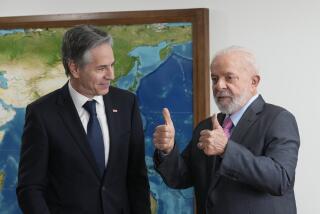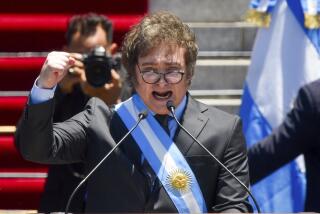Brazil Under Pressure to Cut Public Deficit for IMF Refinancing
- Share via
RIO DE JANEIRO — Four months after the restoration of civilian government in Brazil, the largest marketplace in Latin America, an unexpected economic surge is under way.
Automotive factories are adding new workers and night shifts to raise production and meet domestic and foreign consumer demand.
Sales of tractors and farm equipment are up, and farmers are harvesting abundant crops under generous government credit and price-support programs.
The major private banks are all reporting large profits for the first half of the year. Interest rates have kept ahead of inflation rates.
Unemployment in the big industrial centers is down, and wage earners have more purchasing power as a result of the slowdown in inflation. Supermarket sales levels here and in Sao Paulo are 10% above what they were at the end of last year.
The buoyancy of the domestic market grows out of consumer demand spurred by a combination of price controls, consumer subsidies and an expansionary wage policy that includes public employees.
Deficit Is Cost
The cost is a public deficit that has been estimated by a mission from the International Monetary Fund at over $10 billion this year. It is being financed by increasing the money supply and a bigger internal public debt at high interest rates.
According to the IMF, if the deficit is not eliminated, inflation will break through the price control system and destroy the economic recovery. Since March, when the new government took office, prices have increased at an average monthly rate of 8%, compared to 12% a month in the first three months of the year.
The government’s target for internal borrowing this year was set at 27-trillion cruzeiros, or about $4 billion at the official exchange rate. Through July, it borrowed 20 trillion, so spending must be reduced to avoid the money-supply increases that would drive inflation over the planned level of about 200% this year. Last year it was 227%.
Government economic planners argue that a spending cutback would stifle growth and reduce tax revenues, deepening the fiscal deficits. But there is no close control of spending. Brazil’s 23 states and nearly 4,000 municipalities are heavily dependent on federal funds, and state enterprises are losing money. Budget management is weak; political pressure determines allocation of scarce funds.
President Jose Sarney, who came to office when President-elect Tancredo Neves died on March 15, is reaping political benefits from the expansionary economic performance. His popularity rating has gone up in recent public opinion polls, and he is applauded when he appears in public.
Sarney has identified his administration with economic growth. He has promised a growth rate of 5% to 6% a year in an economy that is producing $220 billion a year in goods and services. He has publicly renounced austerity measures that would restrain demand as a way of cutting back inflation.
This has produced disagreement between the new government and the IMF. Brazil and the fund are far apart on the terms of a standby agreement under which Brazil hopes to ask international creditors to stretch out over a 16-year period the repayment of about $45 billion in debts due by 1991.
Largest Debtor
Brazil is the developing world’s largest debtor, owing banks and governments more than $100 billion. Its relationship with the IMF is a key factor in international management of the Third World’s total debt of $360 billion.
Brazil is under pressure from the IMF to make new cuts in public deficits as a condition of obtaining refinancing of its debt. But there is strong political and business resistance to this course.
Sarney has decided that moderate, controlled inflation is better for Brazil than a period of recession. This position is backed by international reserves of $8 billion and prospects for a $12-billion trade surplus this year. That would pay this year’s interest on the foreign debt.
Sarney depends on three key advisers in negotiating with the IMF. One is Finance Minister Francisco Dornelles, a taxation expert who is considered a fiscal conservative. Another is Planning Minister Joao Sayad, who has a Ph.D. in economics from Yale University and a Keynesian view of stimulating economic growth through public spending.
The third is Luiz Paulo Rosemberg, Sarney’s personal economic adviser, a former consultant to large electronic firms. He has a master’s degree in economics from Vanderbilt University and has been on the faculty at the University of Sao Paulo.
Rosemberg has been named by Sarney as mediator between the orthodox technicians of the Finance Ministry and Central Bank and the “progressive” planners around Sayad. As such, he has taken on a key political role, which includes running the IMF negotiations.
Rosemberg has admitted that there is a difference of 16-trillion cruzeiros ($2.5 billion) between Brazil’s budget deficit estimate and the IMF’s figure, but he denied at a recent press conference that there was an “impasse” in the negotiations.
According to Sarney, Brazil has no intention of breaking with the IMF and will continue negotiations until an agreement is reached. And Foreign Minister Olavo Setubal returned from Lima, where he attended the inauguration of Peru’s new President Alan Garcia, with word that Brazil will not follow Peru’s lead in rejecting the IMF.
Whatever the outcome of Brazil’s negotiations with the IMF, they will be closely followed by all Third World debtors and international bankers as a practical test of whether borrowers can obtain terms for debt refinancing that permit economic growth.
More to Read
Sign up for Essential California
The most important California stories and recommendations in your inbox every morning.
You may occasionally receive promotional content from the Los Angeles Times.













